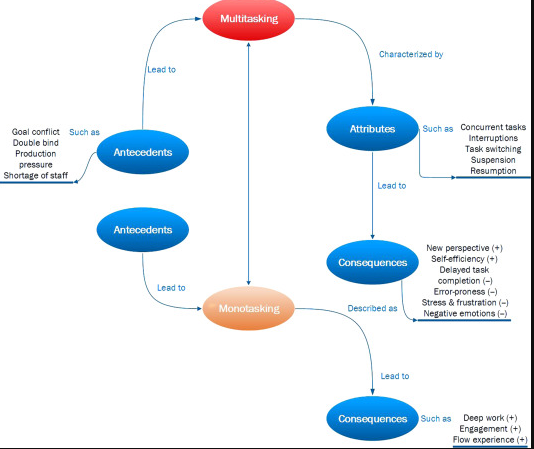By Penny Zenker

Originally published by THE FOCUSOLOGIST
Multitasking may seem like a great way to get a lot of things done at the same time. It even makes us feel good – because it releases dopamine in our brain. Some people even believe that the ability to multi-task is a mark of working hard. But then when we simultaneously jump from one task to the next, a lot of things can go wrong. What if, I told you there are hidden dangers of multitasking?
I recently read a multitasking research report for the Federal Agency for Healthcare Research and Quality, Dr. John Halamka, the Chief Information Officer at Harvard Medical School, about multitasking gone wrong.
A doctor failed to stop giving her patient, Warfarin, a blood thinner because she received a text message while checking on her patient, which subsequently made her forget her intentions in the first place. This error was only discovered two days later, after the patient’s blood had become so thin that it was spontaneously filling the sac around his heart, stopping it from pumping correctly. Subsequently, the patient had to undergo open-heart surgery to drain the blood and save his life.
This might seem like a rare scenario, but there are so many awful things that come from multitasking even when it’s not about life and death.
The brain isn’t wired for the dangers of multitasking
We do know that our brain is bigger and smarter than the computer. But there’s a reason the computer can outshine the human brain.
Unlike the human brain, the computer can process thousands of data at the same time. Research also shows that the human brain performs best when it concentrates on one task at a time – and that’s why multitasking isn’t the answer to anything.
In reality, when we think we are multitasking, our brains are only switching quickly from one task to the next. Hence multitasking in itself is a myth.
And, when we switch from one task to another, we tend to lose focus and become prone to making mistakes. This in turn limits the quality of our work. This is the danger of multitasking.
Multitasking also has other hazardous effects on the brain. First, prolonged multitasking causes us to become prone to memory loss and horribly impacts our IQ. Research even shows it can lower our IQ by 15 points, that’s a lot!
Secondly, chronic multitasking can make us become too impulsive and more likely to downplay the risks of tackling too many things at once. So, it lowers our executive control and limits our cognitive resources.
THERE’S NO SUCH THING AS MULTITASKING, THERE’S ONLY TASK SWITCHING WHICH TAKES A TOLL ON OUR MIND AND PRODUCTIVITY.

Multitasking psychology is not profitable
The American Psychological Association states that interchanging tasks leads to a 40% loss in productivity. No matter how agile you seem to be jumping from one task to the next, you are actually losing a lot to lack of attention, and confusion. Consider that it is proven that we require up to 25 minutes to get back on track after our attention shifts away from the task in front of us. Then you realize that multitasking is the culprit behind all those delayed deadlines and inefficiency.
The increased mental demand for jumping from one thing to the next makes you work at a slower pace, 2 x slower than my own studies.
Hence, it is more likely to stop you from giving the best performance. Naturally, the numerous negative effects of multitasking may not seem obvious when doing simple things like walking or listening to music. But when we have a complex task (or tasks) to handle, multitasking only disorganizes us.
Multitasking stops us from learning
Learning is an important part of life, both personally and professionally. But in order to learn or improve our creative abilities, we also need to focus.
When we multitask, we accomplish less and slowly lose our ability to focus enough to learn new things. Evidence even suggests that constantly multitasking makes it harder for us to tune out everything else and focus on what is in front of us – a trait that is highly necessary for deeper processing and learning.
Hence, when we become multitaskers, we find it harder to focus our attention even when we are not working on multiple tasks at once. So, in this case, we’ve become great task switchers, that we now go in search of things to distract us.
Multitasking prioritizes urgency than the impact
There’s always something to do with varying scope and technicality. But some of these tasks are more important and beneficial than others which may have urgency attached to them.
Striking a balance between urgent and important tasks is highly important to success. However, it’s harder to discern and prioritize important tasks over urgent tasks when multitasking. Urgency is crowding out the importance and we are losing our ability to effectively prioritize. Multi-tasking is eroding our ability to focus on what is most important.
Multitasking makes it harder to make good decisions
One of the most important leadership skills is the ability to decide to do one thing instead of another, and change the rules for the previous task into the rules for the new task. These are the two stages of the executive control process, known as goal shifting and rule activation.
Multitasking is managed using these two executive functions and stages in the brain. When we multitask, we become slower at making those two decisions. When messaging others and watching TV, at the same time, it may not seem like a big deal. But consider how it impacts important stuff, especially where productivity and safety are critical, like driving in heavy traffic. Hence multitasking limits our ability to make critical decisions when necessary.
Multitasking increases the tendency to burnout
The constant switching causes a tense working environment that creates fear and sadness. These unpleasant emotions, paired with confusion elevates stress. Overall, we become exhausted and when you also factor in the fact that the most important tasks are not getting done or that they are riddled with too many errors, fatigue, fear, and anger are inevitable.
MULTITASKING IS AN ENEMY TO DEEP WORK, AND GROWING OUR CREATIVE ABILITY.

The effects of multitasking in the workplace
How to stop multitasking – 8 amazing ways to overcome the dangers of multitasking
Multitasking is not the solution to anything. You need to resist the urge to multitask, especially in the face of an overwhelming set of tasks. No matter how much it seems like you would be able to attend to all of them at once – you can never achieve that. If you already struggle with multitasking, here are steps you can use to break the habit of multitasking.
#1 Automate or delegate unimportant tasks
This may seem like an obvious solution but it isn’t. It is important to categorize tasks in front of you to figure out what you should handle over tasks that should be automated or delegated to others. Always strive to focus on the most important and push the unimportant task off your desk to create free and valuable time.
#2 Identify distractions and turn them off
Multitasking in itself is a distraction – what else can you call the constantly divided attention between unplanned phone calls, scrolling through social media, replying to irrelevant emails, and sharing some attention-grabbing news reports?
There are just too many things clamoring for our attention that it becomes harder to know where to draw the line.
What can you do about these distractions?
Simple, be intentional about what gets your attention. Identify what distracts you and get rid of them. For instance, if you receive too many notifications, mute them. You shouldn’t be getting them when working. Instead have allocated time for checking through notifications.
If you deal with too many emails, consider managing your emails with the rules I outlined in this article. If you get carried away by social media, consider switching off your personal mobile device when working?
What other distractions are stopping you from achieving your goals? Figure them out and eliminate those habits.
#3 Avoid procrastination
Procrastination is often one of the reasons we resort to multitasking to make up for the missed time. It is important to realize that every lost minute can never be regained.
So instead of always trying to make up for the lost time, focus on building better habits and actually completing tasks. That way you gain better control of your time and can achieve your goals and projects to the best of your abilities.
#4 Use the “20-minute rule”
To break the temptation of constantly switching between tasks, you can also be intentional about devoting your attention to one task for 20 minutes. This can further influence you to devote even more time to the same tasks.
That said, if the 20-minute rule is too short and convoluted, you can try the Pomodoro technique which is basically, working for X minutes of time followed by X minutes of rest.
Here’s a general example of the Pomodoro technique:
- Set a timer to work for 25 minutes followed by a 5-minute break
- Begin another block of 25 minutes of work or “Pomodoro”
- Complete 2 more Pomodoro before taking an extended 20 minutes break.
#5 Avoid multitasking in the smallest things
Evidence suggests that frequently media multitasking such as scrolling through social media while watching a movie or checking email while listening to music can actually also make us more distracted and less able to focus our attention.
#6 Be intentional about taking breaks
There will always be plenty of work to do at any given time. But taking breaks can help you reinforce the need to focus on doing a single task at a time.
Quality breaks provide ample time to relax your nerves. And by quality, I mean focusing on doing absolutely nothing (not scrolling on social media or mind-busying activities).
#7 Set boundaries
Do you find it hard saying no to more tasks? Then you need to realize that growing means minimizing access to yourself and prioritizing what makes you better. So, when next you wish to say Yes when you meant No, think about the words of Brene Brown:
“When we fail to set boundaries and hold people accountable, we feel used and mistreated.”
#8 Instead of subscribing to the dangers of multitasking – choose task batching
Most people split their daily activities into three parts; time for work, time for socializing and relaxation, and time to sleep. However, that’s not enough to gain focus, as all tasks are not equal and when trying to block rigid sets of time, we may be faced with the dilemma of letting some, “easy tasks” stay undone for too long.
What if you considered task batching?
Task batching is the process of pairing similar tasks together. For instance, you may consider doing all your finances at once – monitoring credit cards, checking balances, and paying bills. Another example is scheduling all your meetings in rapid succession at one part of your day.
Batching is a time management skill that puts you in a ‘focus’ zone and improves the flow of work. It further decreases decision fatigue, making you less prone to distraction. So how do you batch tasks?
First, identify tasks you can group together – such as low priority tasks like checking email and text messages, preparing meals and grocery shopping, listening to a podcast, and taking a walk. Leila Mooney further illustrates a great way to start batching your tasks:
“Start by creating a mega to-do list. Be sure to include all the things you need to get done, including household duties, things you WANT, not just NEED to do, and even social and/or family responsibilities… Now go through that list (perhaps with different color highlighters, if you’re anything like me) and classify each item by the skill or concentration needed to complete the task.”
Final thoughts
Getting rid of the habit of multitasking won’t be easy, but you can do it.
In this time and age, it’s so easy to fall into the temptation of multitasking. And it won’t be easy managing your time and learning to focus on one thing (or group of tasks) at a time. However, it is also not impossible. To overcome the impulse to multitask, you need to focus on the process and always remember – consistency would help you get better.
Don’t bother with trying to perfect your time management skills just yet. All you need to do is focus on being intentional about avoiding the tendency to multitask by consistently doing and reinforcing better habits. In no time, you will become so good that it’s easier to “be in the zone” and give your best at your work.
About the Author

Penny Zenker is The Focusologist, international motivational speaker, business strategy coach, and best-selling author. Penny founded, developed, and sold her first multi-million dollar business while living in Zurich, Switzerland. Later at the world’s 4th largest Market Research company, she managed business unit turnarounds and was a Tony Robbins business coach helping entrepreneurs around the world to double their businesses.
Her clients tell her, her gift is cutting through the clutter and helping them focus on the most important and relevant areas to sustainably grow their businesses.
Penny’s high-energy and interactive keynote presentations, motivational speeches and workshops inspire and challenge you to think act and be more strategically, Be more emotionally intelligent, and inspire personal leadership.
Penny is the bestselling author of The Productivity Zone: Stop the Tug of War with Time. As a master NLP practitioner and neuro-strategist, she integrates the elements of thought, communication, and behavior to provide strategies for positive changes and maximum results. Penny’s expertise focuses on strategic thinking, leadership, problem-solving, communication, and productivity. She has coached hundreds of successful business leaders and entrepreneurs in leadership roles, relationships, and building culture.


